小学语法一般将来时【精选】
- 格式:ppt
- 大小:1.44 MB
- 文档页数:12
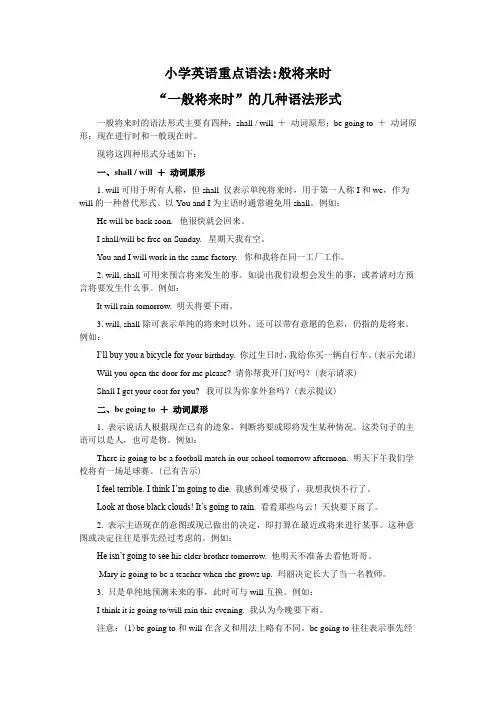
小学英语重点语法:般将来时“一般将来时”的几种语法形式一般将来时的语法形式主要有四种:shall / will +动词原形;be going to +动词原形;现在进行时和一般现在时。
现将这四种形式分述如下:一、shall / will +动词原形1. will可用于所有人称,但shall 仅表示单纯将来时,用于第一人称I和we,作为will的一种替代形式。
以You and I为主语时通常避免用shall。
例如:He will be back soon. 他很快就会回来。
I shall/will be free on Sunday. 星期天我有空。
You and I will work in the same factory. 你和我将在同一工厂工作。
2. will, shall可用来预言将来发生的事。
如说出我们设想会发生的事,或者请对方预言将要发生什么事。
例如:It will rain tomorrow. 明天将要下雨。
3. will, shall除可表示单纯的将来时以外,还可以带有意愿的色彩,仍指的是将来。
例如:I’ll buy you a bicycle for y our birthday. 你过生日时,我给你买一辆自行车。
(表示允诺)Will you open the door for me please? 请你帮我开门好吗?(表示请求)Shall I get your coat for you? 我可以为你拿外套吗?(表示提议)二、be going to +动词原形1. 表示说话人根据现在已有的迹象,判断将要或即将发生某种情况。
这类句子的主语可以是人,也可是物。
例如:There is going to be a football match in our school tomorrow afternoon. 明天下午我们学校将有一场足球赛。
(已有告示)I feel terrible. I think I’m going to die. 我感到难受极了,我想我快不行了。
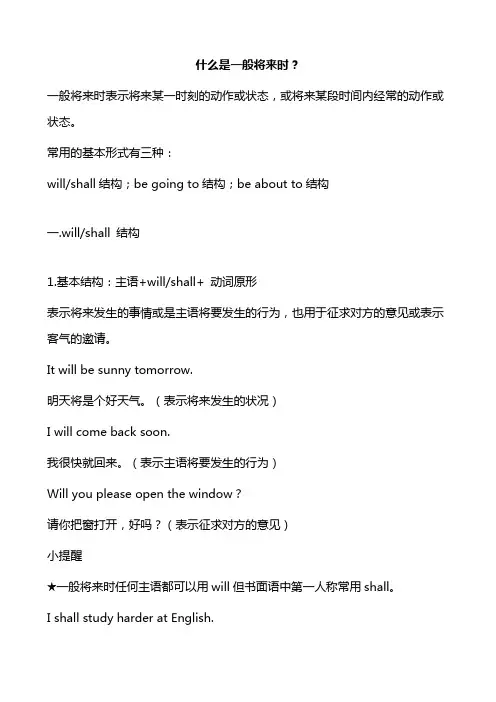
什么是一般将来时?一般将来时表示将来某一时刻的动作或状态,或将来某段时间内经常的动作或状态。
常用的基本形式有三种:will/shall结构;be going to结构;be about to结构一.will/shall 结构1.基本结构:主语+will/shall+ 动词原形表示将来发生的事情或是主语将要发生的行为,也用于征求对方的意见或表示客气的邀请。
It will be sunny tomorrow.明天将是个好天气。
(表示将来发生的状况)I will come back soon.我很快就回来。
(表示主语将要发生的行为)Will you please open the window?请你把窗打开,好吗?(表示征求对方的意见)小提醒★一般将来时任何主语都可以用will但书面语中第一人称常用shall。
I shall study harder at English.我将更加努力地学习英语。
Shall we go to see a film?我们去看电影好吗?★will,shall和主语都可以缩写成’llI’ll fly to London.我要坐飞机去伦敦。
They’ll visit the museum tomorrow.他们明天要参观博物馆。
2. 一般疑问句:将will/shall提到句首Will you go there?你要去那儿吗?3.否定句:在will/shall后加not,可缩写成won't/shan't陈述句:I will go there./I shall go there.我要去那儿。
否定句:I won't go there. /I shan't go there.我不去那儿。
4. 特殊疑问句:特殊疑问词+ will/shall +主语+动词原形+其他?What will he do this evening?今晚他准备做什么?(针对动词提问)When will you visit him?你什么时候去拜访他?(针对时间提问)Where will they have a running race?他们准备在哪里赛跑?(针对地点提问)二.be going to结构be going to表示主观的打算或计划,一般指近期或事先考虑过的将要发生的动作以及已有迹象表明必将发生某事,意为“打算,就要”。
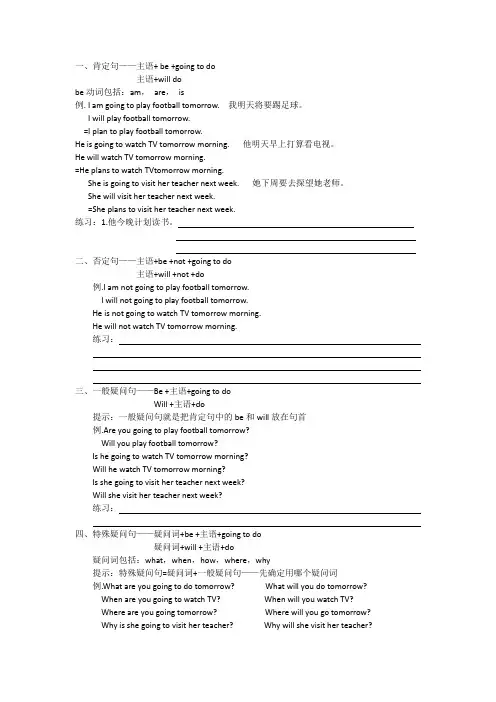
一、肯定句——主语+ be +going to do主语+will dobe动词包括:am,are,is例. I am going to play football tomorrow. 我明天将要踢足球。
I will play football tomorrow.=I plan to play football tomorrow.He is going to watch TV tomorrow morning. 他明天早上打算看电视。
He will watch TV tomorrow morning.=He plans to watch TVtomorrow morning.She is going to visit her teacher next week. 她下周要去探望她老师。
She will visit her teacher next week.=She plans to visit her teacher next week.练习:1.他今晚计划读书。
二、否定句——主语+be +not +going to do主语+will +not +do例.I am not going to play football tomorrow.I will not going to play football tomorrow.He is not going to watch TV tomorrow morning.He will not watch TV tomorrow morning.练习:三、一般疑问句——Be +主语+going to doWill +主语+do提示:一般疑问句就是把肯定句中的be和will放在句首例.Are you going to play football tomorrow?Will you play football tomorrow?Is he going to watch TV tomorrow morning?Will he watch TV tomorrow morning?Is she going to visit her teacher next week?Will she visit her teacher next week?练习:四、特殊疑问句——疑问词+be +主语+going to do疑问词+will +主语+do疑问词包括:what,when,how,where,why提示:特殊疑问句=疑问词+一般疑问句——先确定用哪个疑问词例.What are you going to do tomorrow? What will you do tomorrow?When are you going to watch TV? When will you watch TV?Where are you going tomorrow? Where will you go tomorrow?Why is she going to visit her teacher? Why will she visit her teacher?。
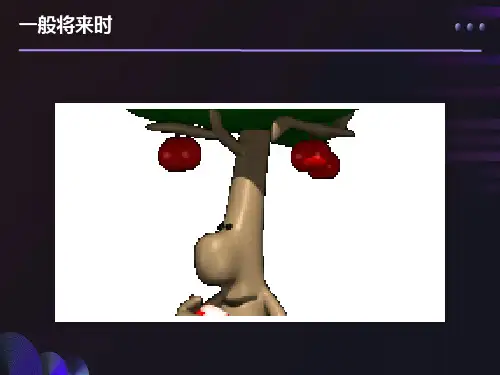
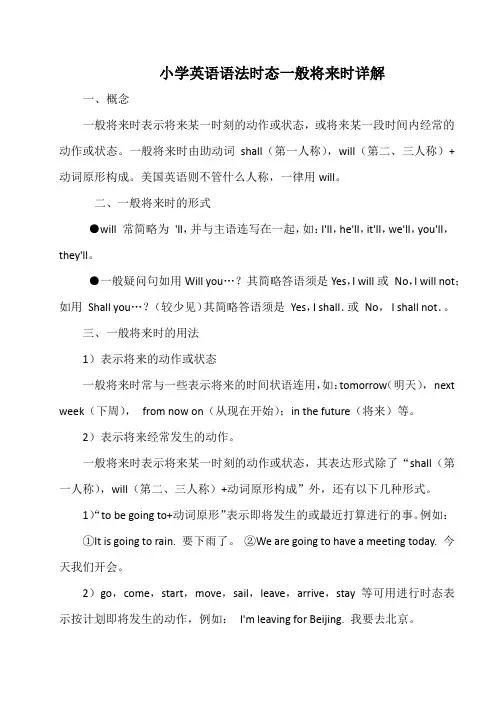
小学英语语法时态一般将来时详解一、概念一般将来时表示将来某一时刻的动作或状态,或将来某一段时间内经常的动作或状态。
一般将来时由助动词shall(第一人称),will(第二、三人称)+动词原形构成。
美国英语则不管什么人称,一律用will。
二、一般将来时的形式●will 常简略为'll,并与主语连写在一起,如:I'll,he'll,it'll,we'll,you'll,they'll。
●一般疑问句如用Will you…?其简略答语须是Yes,I will或No,I will not;如用Shall you…?(较少见)其简略答语须是Yes,I shall.或No,I shall not.。
三、一般将来时的用法1)表示将来的动作或状态一般将来时常与一些表示将来的时间状语连用,如:tomorrow(明天),next week(下周),from now on(从现在开始);in the future(将来)等。
2)表示将来经常发生的动作。
一般将来时表示将来某一时刻的动作或状态,其表达形式除了“shall(第一人称),will(第二、三人称)+动词原形构成”外,还有以下几种形式。
1)“to be going to+动词原形”表示即将发生的或最近打算进行的事。
例如:①It is going to rain. 要下雨了。
②We are going to have a meeting today. 今天我们开会。
2)go,come,start,move,sail,leave,arrive,stay等可用进行时态表示按计划即将发生的动作,例如:I'm leaving for Beijing. 我要去北京。
3)“be to+动词原形”表示按计划要发生的事或征求对方意见。
例如:①Are we to go on with this work?我们继续干吗?②The boy is to go to school tomorrow.这个男孩明天要去上学。
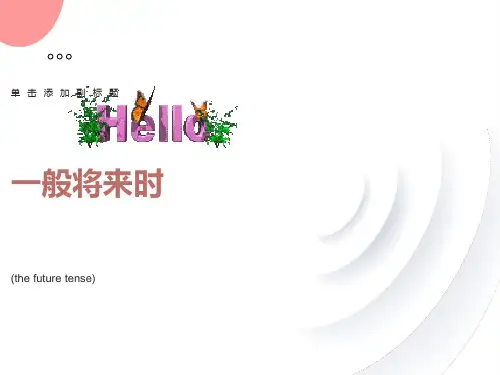

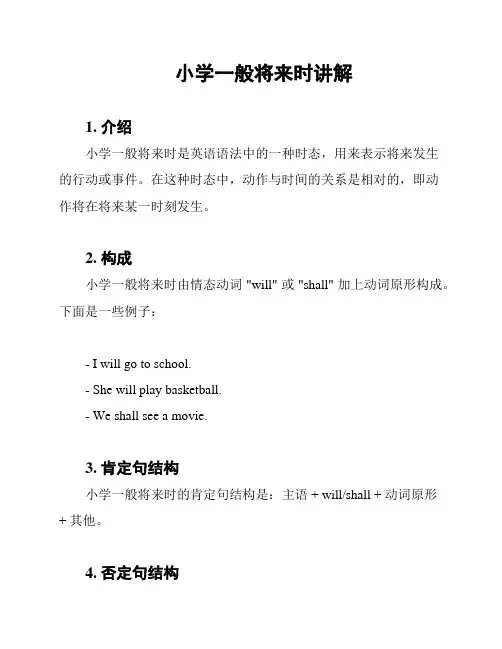
小学一般将来时讲解1. 介绍小学一般将来时是英语语法中的一种时态,用来表示将来发生的行动或事件。
在这种时态中,动作与时间的关系是相对的,即动作将在将来某一时刻发生。
2. 构成小学一般将来时由情态动词 "will" 或 "shall" 加上动词原形构成。
下面是一些例子:- I will go to school.- She will play basketball.- We shall see a movie.3. 肯定句结构小学一般将来时的肯定句结构是:主语 + will/shall + 动词原形+ 其他。
4. 否定句结构小学一般将来时的否定句结构是:主语 + will/shall + not + 动词原形 + 其他。
5. 疑问句结构小学一般将来时的疑问句结构是:Will/Shall + 主语 + 动词原形+ 其他?6. 使用场景小学一般将来时常用于以下场景:- 表示未来的计划或打算:I will go to the park tomorrow.- 表示预测:It will rain later.- 表示意愿或请求:Will you help me with my homework?7. 注意事项在小学一般将来时中,我们要注意以下几点:- 不使用"will"或"shall"来表达对他人的承诺或决定,如"I promise"或"I decide"。
- 在口语中,经常使用"will"而不是"shall"。
- 在第一人称疑问句中,我们可以使用"shall"代替"will",但这并不常见。
希望这份文档对你的小学一般将来时的学习有所帮助!。
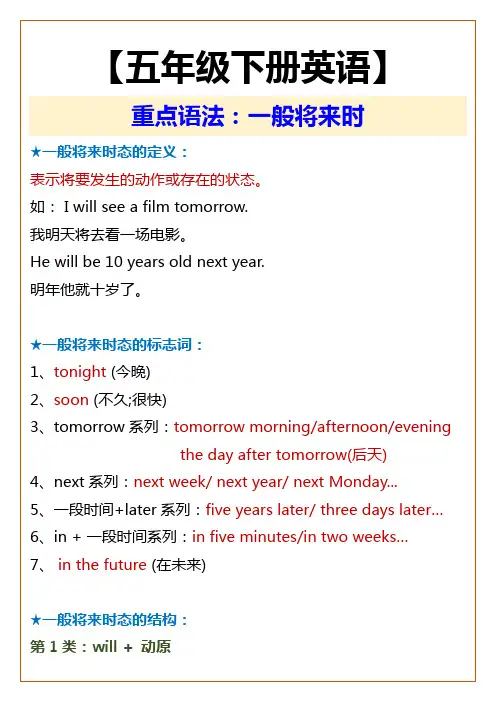
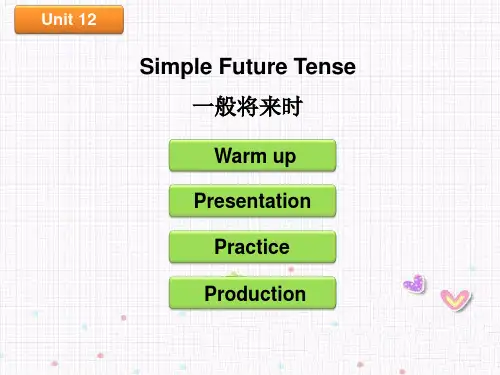
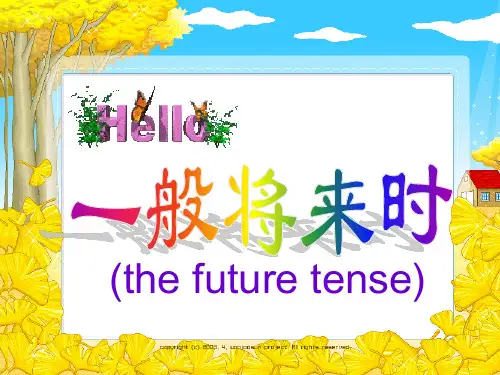
英语一般将来时句子1. I will finish my homework tomorrow.2. They will visit the museum next weekend.3. He will buy a new car next year.4. She will cook dinner tonight.5. We will go to the beach next summer.6. You will meet your friend at the party.7. The dog will chase the cat.8. It will rain tomorrow.9. The students will take the exam next month.10. The company will launch a new product next week.11. He will travel to Europe next summer.12. They will start a new project next Monday.13. She will give a presentation at the conference.14. We will have a picnic next Sunday.15. You will see the doctor tomorrow.16. The team will win the game.17. It will be sunny next weekend.18. The flowers will bloom in the spring.19. He will study for the test.20. She will graduate from college next year.21. They will finish the construction project next month.22. We will celebrate our anniversary next week.23. You will take a vacation next month.24. The concert will start at 8 pm.25. It will snow in the mountains.26. The company will open a new branch in the city.27. The baby will learn to walk soon.28. He will start a new job next week.29. She will plant a garden in the backyard.30. We will attend the wedding next weekend.31. You will visit your grandparents next month.32. The children will start school in the fall.33. The team will compete in the tournament.34. It will be hot in the summer.35. The building will be completed by the end of the year.36. He will join the gym next month.37. She will bake a cake for the party.38. They will adopt a new pet next year.39. We will go on a trip next summer.40. You will learn a new language.41. The company will expand its business.42. The movie will be released next month.43. It will take time to finish the project.44. The students will graduate in the spring.45. She will start a new job next week.46. They will move to a new house next month.47. We will attend the concert next weekend.48. You will learn to play the piano.49. The flowers will bloom in the garden.50. He will run a marathon next year.51. The team will practice for the game.52. It will be a busy day tomorrow.53. The company will introduce a new product.。
小学英语语法一般将来时1、定义:表示将要发生的动作或存有的状态,以及打算、方案或准备某事。
句中一般含有表示将来的时间状语,如:tomorrowmorning,nextweek,thisafternoon等表示将来的时间状语。
2、构成:①begongto+动词原形如:IamgoingtoseeaBeijingoperatomorrow.Wearegoingtomeetatbusstopathalfpastten.DadandIaregoingtoseeaBeijingoperathisafternoon.will+动词原形如:Theywillgoswimmingthisafternoon.3、begoingto 和will 区别:①begoingto表示经过事先安排、打算或决定要做的事情,根本上一定会发生;will那么表示有可能去做,但不一定发生,也常表示说话人的临时决定。
如:Iamgoingtotakepartinapartythisevening.Theyarecleaningthelibrarynow.I ’llgoandjointhem.②begoingto表示近期或眼下就要发生的事情;will表示的将来时间那么较远一些。
如:Heisgoingtowritealettertomorrow.Iwillmeetheroneday.begoingto还能够用来表示有迹象说明某件事将要发生,常用于天气等自然现象。
如:Look!It’sgoingtorain.4、一般将来时句型转换:肯定句/否认句/一般疑问句及答复Sheisgoingtohaveapicnictomorrow./Sheisn ’tgoing tohaveapicnictomorrow./ —Isshegoingtohaveapicnic tomorrow?—Yes,sheis./No,sheisn ’t.Theywillgoswimmingthisafternoon./Theywillnot(won’t)goswimmingthisafternoon./—Willtheygoswimmingthisafternoon? —Yes,theywill./No,theywon’t.。
一般将来时一、一般将来时:表示将来某个时间要发生的动作、事情,或存在的状态。
二、.结构:▲(1)主语+will/shall + 动词原形+(其他)shall 用于主语是第一人称单数,will 在陈述句中用于各人称.I shall do my homework tomorrow morning.I/He/She/They will do my/his/her/their homework tomorrow morning. He will get up soon.I will=I Shall=I’ll★在表示客观事实的时候只能用此结构。
(1).It will rain tomorrow.明天将要下雨.(2).It will be Teachers' Day the day after tomorrow.后天将是教师节.(3).My birthday will come.我生日将要到了.▲(2)主语+am/is/are going to + 动词原形+(其他)a.主语的意图,即将做某事。
I am going to Shanghai tomorrow.b.计划,安排要发生的事。
The play is going to be produced next month。
c.有迹象要发生的事。
Look at the dark clouds, there is going to be a storm.(3)主语+be +to+动词原形+(其他),表示按计划要发生的事或征求对方意见。
We are to discuss the report next S aturday.(4)主语+am/is/are about to +动词原形,意为马上做某事。
He is about to leave for Beijing.(5)主语+be+v-ing,表示将来,表示按计划即将发生的动作,这类动词有 go, come,start,move,sail,leave,arrive,stay,live,fly。